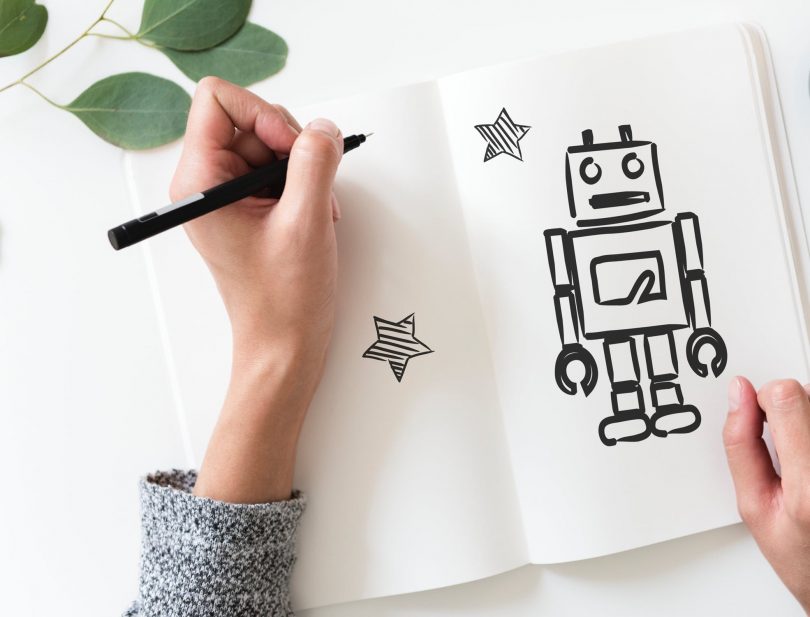Artificial Intelligence (AI) offers great promise – in principal. News stories outlining the effects are so significant that they have been called the Fourth Industrial Revolution and are reported, in the news, almost daily.
AI products offer a string of benefits, both economic and societal. In the same breath, experts talk about financial efficiencies and the looming threat AI presents to millions of jobs. What is of less immediate certainty is the pragmatic ways in which small businesses can benefit from AI.
Here, we explain the key concepts involved in all AI solutions.
What is AI for Small Business?
In reality, AI solutions deliver one primary benefit to businesses of all sizes – they improve efficiency. Those efficiency benefits are often realised through the automation of a task which is performed by a human.
In the simplest terms, AI is simply a new productivity tool, just as the home or office PC was.
It’s worth understanding the conceptual components involved in every AI solution:
- AI runs off large quantities of data: There’s a reason you see big technology companies working on AI at the moment. It’s because they have one of the key elements required to develop a successful AI program. They have lots and lots of data.
Believe it or not, one of the fastest growing areas of AI is the smartphone. Google have over 1 billion Android smartphones generating data which is sent, using mobile data connections, to the cloud. Handset manufacturers are even building special AI chips to handle the data in smartphones.
- AI is essentially an algorithm which does pattern matching: Many of the principals involved in delivering AI solutions have been around since the mid 80s. There are clever Bayesian mathematical links between the input to and outputs from AI solutions and processes like ‘back propagation’ which connect them. Fortunately, you don’t need to worry about those. AI as it stands, in its most advanced form anywhere on the planet is simply ‘fuzzy’ pattern matching.
- AI uses humans to tell it the right answer: It’s no secret, but there is no magic in AI. AI systems don’t ‘know’ anything. They can help a Doctor spot lung cancer but they don’t ‘know’ what a lung is or what cancer is. A real flesh and blood person trains the AI algorithm and associates the image of the lung with diseased / not diseased.
Understanding AI solutions in Simple Terms
To further understand the full effect of AI, let’s take a look at this example:
- To increase efficiency in lung cancer detection, a Health Service employs an AI solution.
- They provide it a large quantity of data in the form of digital images of lungs.
- A person trains the AI algorithm, on which of those images shows a lung with cancer, and which does not.
- As a result, after the training, when shown a digital image of a lung, the algorithm uses fuzzy pattern matching to estimate whether the lung it is looking at is or is not likely to contain cancer.
If sufficiently trained, the AI algorithm may become much faster and more accurate than a human at performing this task. The AI may even replace a component of the human’s job (importantly, the element replaced is often the most repetitive and least interesting part of that job.)
However, 5 years later, neither the AI algorithm or the computer it runs on will know what a lung is or feel the natural sorrow a Doctor would when he or she sees evidence of the disease.
Small business: Get on the front foot with AI
If you think AI is a big deal now, consider how it might look in 5 years. The technology is, as we’ve seen built on two things -large data sets and the facilities to process them.
Progress is fast. Some estimates suggest that AI is already part of 85% of our digital interactions. It’s what puts your Netflix recommendations together and shows you that ‘people like you also bought this.’
The technology is the subject of Nation Building investments in Europe, China and a growing proportion of the rest of the world, especially in the UK. Governments are staking reputations on leading the world in AI, notably China which has invested no small amount in the technology. The Financial Times reported, earlier this year, that half of all global AI investments were made in China.
Small businesses take many forms – from a one man band (which might be run by a woman) to a 250 or even 499 person company. Whatever size you are, there is a way your business can benefit from AI. If you’re on your own or lead a small team, consider off the shelf solutions and challenge yourself to make a bad chatbot – so you can improve it. If you’re a bigger small businesses, consider how AI can help your customers get what they want from you.
Make no mistake, as a business owner, the benefits of AI are going to flow to you. Like any IT initiative AI improves productivity, cuts cost and helps you sell more at a lower cost per unit. When millions of jobs are being displaced by AI automation in all it’s forms, it makes sense to be a small business owner which understands at least the rudiments of this world changing technology.
Now: Find out more about how you can operationalize AI solutions for your business here.
“The opinions expressed by BizWitty Contributors are their own, not those of BizCover and should not be relied upon in place of appropriate professional advice. Please read our full disclaimer."







